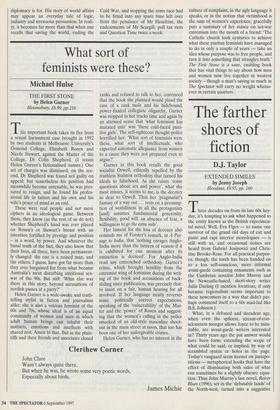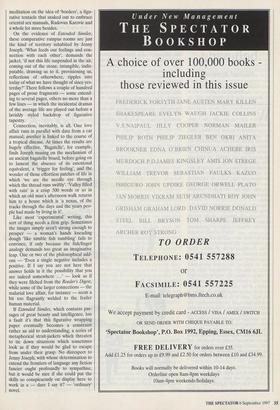The farther shores of fiction
D.J. Taylor
EXTENDED SIMILES by Jenny Joseph Bloodaxe, £9.95, pp. 160 Three decades on from its late 60s hey- day, it's tempting to ask what happened to the entity known as the British experimen- tal novel. Well, Eva Figes — to name one survivor of the grand old days of cut and paste and rapt interior monologues — is still with us, and occasional noises are heard from Gabriel Josipovici and Chris- tine Brooke-Rose. For all practical purpos- es, though, the torch has been handed on to a less self-conscious, more informal avant-garde containing ornaments such as the Cumbrian novelist John Murray and the Newcastle-based, short-story writer Julia Darling (I mention locations, if only because regionalism seems important to these newcomers in a way that didn't per- haps commend itself to a 60s mad-lad like B.S. Johnson.) What, in a debased and decadent age, when even the spikiest, stream-of-con- sciousness monger allows Joyce to be inim- itable, are avant-garde writers interested in? Thirty years ago the pat answer would have been form: extending the scope of what could be said, or implied, by way of scrambled syntax or holes in the page. Today's vanguard seem keener on juxtapo- sitions — metaphorical hooks that have the effect of illuminating both sides of what can sometimes be a slightly obscure equa- tion. Thus John Murray's last novel, Reiver Blues (1996), set in the 'debatable lands' of the North-west, turned into a suggestive meditation on the idea of 'borders', a figu- rative tentacle that snaked out to embrace oriental sex manuals, Radovan Karovic and a whole lot more besides.
On the evidence of Extended Similes, these comparative rumpus rooms are just the kind of territory inhabited by Jenny Joseph. 'What feeds our feelings and con- nection with each other', demands the jacket, 'if not this life suspended in the air, coming out of the stone, intangible, indis- putable, drawing us to it, provisioning us, reflections of otherwhere, ripples into today of what we have thought of since yes- terday?' There follows a couple of hundred pages of prose fragments — some extend- ing to several pages, others no more than a few lines — in which the incidental dramas of the average life are played out before a lavishly styled backdrop of figurative tapestry.
Connection, inevitably, is all. One love affair runs in parallel with data from a car manual; another is linked to the course of a tropical disease. At times the results are hugely effective. 'Bagatelle', for example, finds Joseph musing on the mechanism of an ancient bagatelle board, before going on to lament the absence of its emotional equivalent, a 'trigger for feeling', and the wonder of those effortless patches of life in which 'we are the needle eye through which the thread runs swiftly'. 'Valley filled with rain' is a crisp 500 words or so in which an old man's afternoon walk returns him to a house which is 'a nexus, of the tracks through the days and the years peo- ple had made by living in it'.
Like most 'experimental' writing, this sort of thing needs a firm grip. Sometimes the images simply aren't strong enough to prosper — a woman's hands kneading dough 'like nimble fish tumbling' fails to convince, if only because the fish/finger analogy demands too great an imaginative leap. One or two of the philosophical add- ons — 'Even a single negative includes a positive. If I say you are not here that answer holds in it the possibility that you are indeed somewhere ... ' — look as if they were filched from the Reader's Digest, while some of the larger connections — the malarial love affair, for instance — seem a bit too flagrantly. welded to the frailer human material.
If Extended Similes, which contains pas- sages of great beauty and intelligence, has a fault it's that this figurative wrapping paper eventually becomes a constraint rather an aid to understanding, a series of metaphorical strait-jackets which threaten to tie down situations which sometimes look as if they would be glad to escape from under their grasp. No disrespect to Jenny Joseph, with whose determination to extend the frontiers of language any fiction fancier ought profoundly to sympathise, but it would be nice if she could put the skills so conspicuously on display here to work in a — dare I say it? — 'ordinary' novel.



























































 Previous page
Previous page